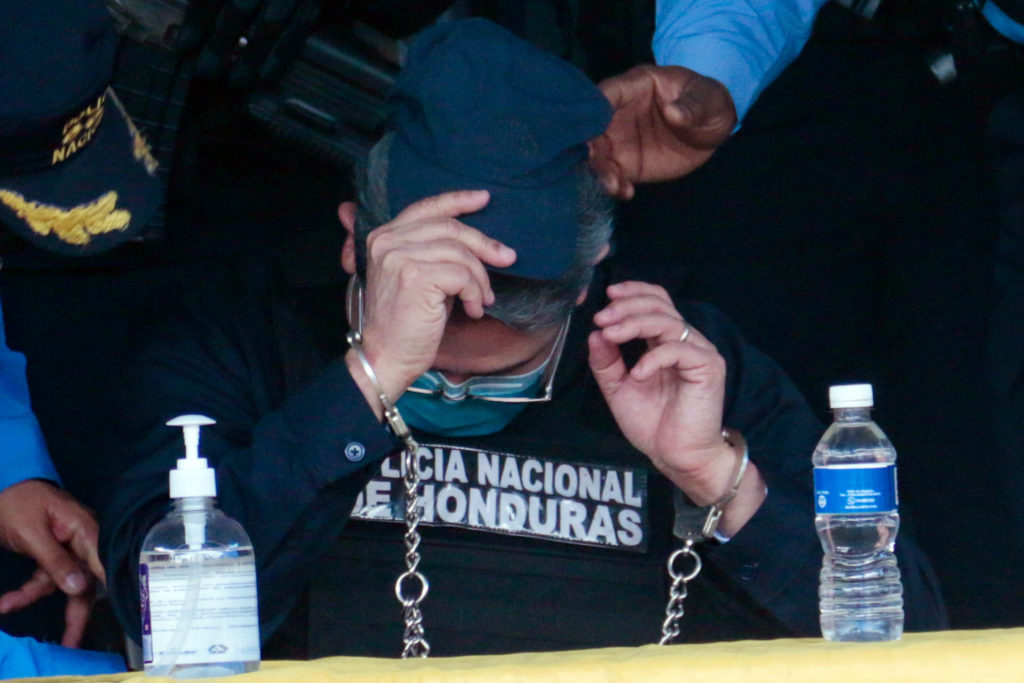A 12-person jury found former President of Honduras Juan Orlando Hernández guilty of drug trafficking and weapons possession charges after a two-week trial in the U.S. Hernández led a drug cartel as president, turning Honduras into a narco-state. The judge is expected to pronounce sentence on June 26, 2024.
Text: Contracorriente
“Tell the world I’m innocent. I love you very much,” Hernández told his sisters-in-law in the U.S. District Court for the Southern District of New York shortly after his conviction. Hernández’s defense said they will appeal the jury’s decision, and Honduras’ National Party insisted that he didn’t have a fair trial. A group of Hondurans sang the national anthem outside the court in celebration of Hernández’s conviction.
“It doesn’t end here; Honduras should get rid of narco-politics. Every single political party was involved in drug trafficking, and Hondurans have to get rid of it,” said Lida Perdomo in company of other Hondurans who migrated to the U.S., escaping from violence and poverty. Many people outside the court said that more trials will take place and U.S. prosecutors in the Southern District will go after other politicians identified as Hernández’s accomplices.
More than two dozen accomplices, including politicians and military and police officers, were mentioned in the trial – among them Ramón Matta Waldurraga, who was acquitted by a Honduran court of money laundering charges in December 2023. Alexander Ardón, former mayor of El Paraíso, in the department of Copán, said that Waldurraga conspired to murder Julián Arístides González, a Honduran prosecutor known as the “anti-drug czar.”
Witnesses repeatedly stated that former President Porfirio Lobo Sosa received drug-trafficking money, which he used to finance his political campaign, in exchange for protection. In like manner, witnesses said that Reynaldo Ekónomo, former congressional representative of the National Party, received money from criminal groups. There was also mention of bribes accepted by Manuel Zelaya Rosales, former president of Honduras and current presidential adviser; Carlos Zelaya, secretary of Honduras’ Congress; and Mauricio Villeda, congressional representative of the Liberal Party.
According to a witness identified as “The Accountant,” Fuad Jarufe, a Honduran businessman, witnessed convicted drug trafficker Geovanny Fuentes bribe then President Hernández in his office.
Moreover, Julián Pacheco Tinoco, minister of security between 2015 and 2021, was among the security agents mentioned. Witnesses said he facilitated drug trafficking in Honduras.
U.S. prosecutors have investigated more than a dozen Honduran drug traffickers, politicians, and businessmen. Attorney General Merrick B. Garland said in a press release after Hernández’s conviction: “Juan Orlando Hernandez abused his position as President of Honduras to operate the country as a narco-state where violent drug traffickers were allowed to operate with virtual impunity, and the people of Honduras and the United States were forced to suffer the consequences. As today’s conviction demonstrates, the Justice Department is disrupting the entire ecosystem of drug trafficking networks that harm the American people, no matter how far or how high we must go.”
Anne Milgram, administrator of the Drug Enforcement Administration (DEA), said, “When the leader of Honduras and the leader of the Sinaloa Cartel work hand-in-hand to send deadly drugs into American communities, both deserve to be held accountable in the United States. This case should send a clear message that no one is above the law or beyond our reach.”
“I remember they shot tear gas at us for protesting high energy prices, the shortage of teachers in schools, and the violence in the country,” said a Honduran migrant, who fled from instability in her community when the 2017 political crisis broke out following Hernández’s unconstitutional reelection.
People outside the court say they are victims of Hernández’s drug conspiracy, repressive measures, and unconstitutional reelection.
Prosecutors stated in the indictment: “Juan Orlando Hernández publicly promoted legislation and the efforts he purported to undertake in support of anti-narcotics measures in Honduras. At the same time, he protected and enriched the drug traffickers in his inner circle and those who provided him with cocaine-fueled bribes that allowed him to obtain and stay in power in Honduras.” They also stressed that Hernández and his accomplices utilized Honduran institutions, including the police and the military, to protect and expand their drug trafficking operations, resorting to violence and murder to maintain “their grip on the Honduran cocaine trade.”
Ana García, Hernández’s wife, issued a press release following the conviction: “This happened to Juan Orlando Hernández today, but it can happen to anyone tomorrow. It’s an injustice done against the only president who stood up against drug traffickers.” She highlighted the lack of evidence presented by prosecutors: “Anyone can be convicted for taking a picture. There were no calls or videos presented in this trial. They only relied on the testimonies of evil and violent men, criminals supported by prosecutors in the Southern District.”
García was wearing a blue vest with the hashtag #volverá (He will come back). Her voice was steady despite “such tragic news for the family,” and said that she hasn’t talked to Hernández since the conviction. “I speak on behalf of Juan Orlando Hernández to let the world know that he is innocent. Don’t give up on him please,” she added.
On the streets of Honduras people were listening to news broadcasts with much anticipation. “Today some people will celebrate Hernández’s conviction, but I feel sad for Honduras. This is not a victory for the country, and it’s sad that justice was done in the U.S. The conviction will damage Hondurans’ reputation. We will now be burdened with the stigma of criminals when traveling,” said Claudia, a customs officer, when she heard the news of the conviction. Javier, a teacher and resident of the Rivera Hernández neighborhood in San Pedro Sula, said he doesn’t feel hopeful that the conviction will change things in Honduras and added, “We won’t feel sad about him.”






